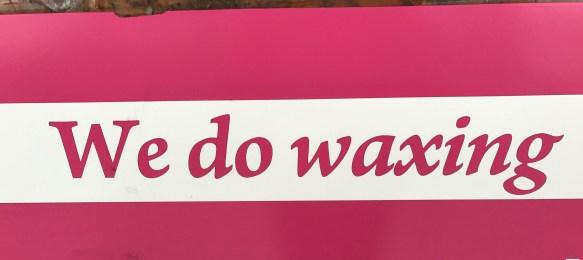I spent the last two weeks as a grammarian in three different cities — Madrid, Granada, and London. Far be it for me to write about Spanish signs, even those translated into English. How could I criticize, given that I wrote the Spanish equivalent of “pitifully, I can’t meet you for dinner” in response to an invitation from a friend? Nor would I dare take on the British. More than two centuries after the colonies declared independence, some Americans — including me — still harbor the idea that English in the Mother Country is superior.
I did notice one or two signs in London, on the window of a shop selling bespoke umbrellas and other, more unusual merchandise:

Paging James Bond.
I go to this shop every time I’m in London, not to buy but to gape. I haven’t yet had the nerve to ask how “dagger canes” differ from “swordsticks,” but if I did, I’m sure one of the extremely helpful employees would explain. Nor have I glimpsed any “life preservers,” unless umbrellas sturdy enough to protect you in a flash flood rate that designation. What interests me about this sign is the punctuation — commas after the first two items and a period (“full stop,” in British English) after the last. Contemporary sign-makers on either side of the Atlantic seldom bother to insert commas. Periods, on the other hand, are trendy. (See “Stop Full Stop” at http://www.grammarianinthecity.com/?p=1364 for more on this subject). But commas and periods together in a sign? Unprecedented, at least for me.
My first thought was that this punctuation reflected a different era, as indeed the store itself does:

Late of 1, 2, & 3 Saville Place.
In fact, the sign understates the store’s age; it was “estd” in 1830. I have no basis for comparison, though, as I was unable to find other signs from the same era.
However, conventions of language tend to be supported by some sort of rationale. I considered the sign again and decided that the commas may be separating items in a list, which ends with a period. In that case, though, I’d expect a conjunction (probably “and”) before “swordsticks.” Furthermore, I wouldn’t expect to find a comma preceding the conjunction — not in Britain. That last comma usually shows up in American lists but not in British lists. It’s called “the Oxford comma” in Britain and, sometimes, “the Harvard comma” in the United States. (Perhaps “ivy comma” should be the universal, trans-Atlantic term?) I finally concluded that the comma between “dagger canes” and “swordsticks” substitutes for the conjunction. There’s a comma before the implied “and” because “and” isn’t on the sign. This theory makes sense to me, but I’m open to other interpretations.
Regardless of punctuation, do visit this shop if you’re ever in London. The life you preserve may be your own.
Like this:
Like Loading...






























